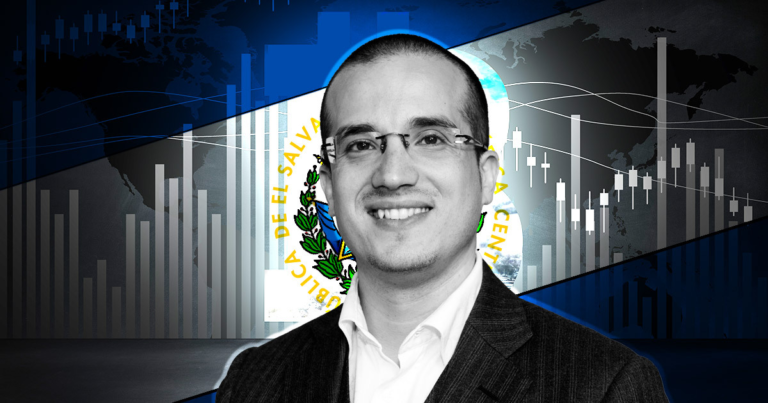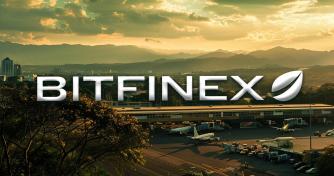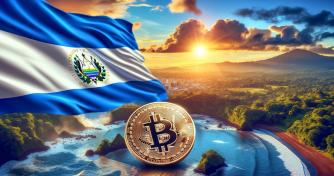 El Salvador’s Bitcoin policy could lead the change in global monetary system – Simon Dixon
El Salvador’s Bitcoin policy could lead the change in global monetary system – Simon Dixon El Salvador’s Bitcoin policy could lead the change in global monetary system – Simon Dixon
Simon Dixon said El Salvador's Bitcoin strategy will help the country get out of the "fiat-based Ponzi scheme debt mechanisms" that the IMF created.

Cover art/illustration via CryptoSlate. Image includes combined content which may include AI-generated content.
Prominent investor Simon Dixon recently described El Salvador’s Bitcoin policy as “very responsible” and said it could be the first domino to fall in bringing down the International Monetary Fund’s (IMF) “fiat-based Ponzi scheme” debt mechanism if it succeeds.
Dixon summarized the world’s financial history to highlight that every financial crisis has led to countries falling into debt, which turned all their economies into over-leveraged systems.
On the other hand, Bitcoin behaves as independent equity that can provide great returns. On a macro scale, investing in Bitcoin can provide a way out of the IMF’s leveraged debt cycle for countries.
Dixon said:
“Betting a percentage of a country’s future, I believe, is a completely responsible, not irresponsible strategy, and the IMF wants countries to follow irresponsible strategies of fiat-based Ponzi scheme debts.”
He continued to say that if El Salvador can successfully play out its Bitcoin investment plan, it can pull itself out of the alleged Ponzi scheme.
Bitcoin as equity
Dixon described investing in Bitcoin as a deleveraging movement away from debt to equity. He said:
“[By] equity, I mean, I was deep in dept trying to create a bank, and then Bitcoin treated me well. I became wealthy because of Bitcoin.”
According to Dixon, investing in Bitcoin is followed by an increase in wealth due to the inevitable rise in Bitcoin’s value. The increased wealth leads to spending more, which ultimately supports the sovereign economy of Bitcoin. Meanwhile, investing in the fiat system results in wealth decreasing over time. The financial loss forces fiat investors to leverage assets and debt.
By that logic, Dixon also argued that the Central Bank Digital Currencies (CBDC) would only carry the IMF’s debt-based Ponzi schemes into the digital platform since it will ultimately be tied to the IMF’s rules. He described the CBDCs as “debt-free money issued by a central bank” and a “speculative attack on fractional reserve banking.”
Following El Salvador to get out of IMF’s “Ponzi scheme”
Looking at the historical milestones and the present financial system situation, Dixon said that countries could borrow from the U.S., the IMF, or China to fund their nations. Moreover, even though a government chooses to borrow from the U.S. or China, it’ll still be borrowing fiat money which is ultimately tied to the control of the IMF.
Dixon argued that the IMF didn’t like it when El Salvador made Bitcoin their legal tender because the possibility of them successfully building an economy around Bitcoin posed a severe threat to the IMF’s current system.
Dixon said:
“If [El Salvador] succeeds, this is a big problem for the business model of the IMF. They’re not a bailout company, they’re not a mechanism for developing the world.”
He continued:
“They’re a mechanism for dollarizing the world and implementing a global central bank digital currency on top of their special drawing rights, so they can maintain control of their mechanisms.”
El Salvador is currently undergoing a restructuring. They’re trying to build a sovereign economy that provides an increase in value, unlike the fiat-based investment options, and is free from the IMF’s debt cycle.
El Salvador’s Bitcoin policy
El Salvador became the first country to accept Bitcoin as legal tender in December 2021 and has accumulated over 2,300 Bitcoins since then. Based on the price movements, the country saw short-term losses and gains.
The IMF has been against El Salvador’s decision to adopt Bitcoin as a legal tender. Moreover, the country’s current Bitcoin reserves are worth slightly more than $50 million based on the current Bitcoin prices, which the IMF leverages to urge El Salvador to drop its Bitcoin policy.
Regardless, El Salvador is keen on its Bitcoin-centered financial system and is confident that the prices will increase to higher levels than before. The county also influenced the Central African Republic (CAR) into adopting Bitcoin as a legal tender.


























































